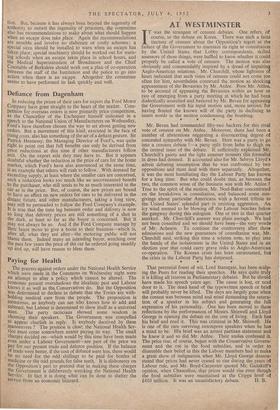AT WESTMINSTER
IT was the strangest of censure debates. One refers, of course, to the debate on Korea. There was such a faint tincture of censure about the Opposition's regret at the failure of the Government to maintain its right to consultation by the United States that Lobby correspondents, skilled assessors of these things, were baffled to know whether it could properly be called a vote of censure. The motion was also obviously and commendably inspired by a dread of impairing Anglo-American relations., Mr. Churchill, whose lightness of heart indicated that such votes of censure could not come too often for him, nevertheless construed the motion as shocking appeasement of the Bevanites by Mr. Attlee. Poor Mr. Attlee, to be accused of appeasing the Bevanites within an hour or two of emerging from a party meeting at which he had been dialectically assaulted and battered by Mr. Bevan for appeasing the Government with his tepid motion and, more serious, for having flouted the known will of the party in declining to insert words in the motion condemning the bombing.
* * 4' * Mr. Bevan had commanded fifty-two backers for this rival vote of censure on Mr. Attlee. Moreover, there had been a number of abstentions suggesting a disconcerting degree of concealed sympathy with Mr. Bevan. Here was a party to go into a censure debate !—a party split from helm to thigh on the central issue of the debate. It sufficiently explained Mr. Churchill's gaiety and the light summer trousers this formalist in dress had donned. It accounted also for Mr. Selwyn Lloyd's adroit debating assumption that he was confronted by two oppositions and must deal with them separately. Altogether, it was the most humiliating day the Labour Party has known for a long time. But who could doubt that, as between the two, the common sense of the business was with Mr. Attlee ? True to the spirit of the motion, Mr. Noel-Baker concentrated on the breakdown in consultation, and balanced some mis- givings about particular Americans with a fervent tribute to the United States' splendid part in resisting aggression. An icy wind seemed to be blowing off the Labour benches below the gangway during this eulogism. One or two in that quarter smirked. Mr. Churchill's answer was plain enough. We had not been consulted and we should have been—the very words of Mr. Acheson. To continue the controversy after these admissions and the new guarantees of consultation was, Mr. Churchill said, striking this time a solemn note, to play into the hands of the isolationists in the United States and in an election year that could carry grave risks to Anglo-American co-operation. The Korean crisis has been surmounted, but the crisis in the Labour Party has deepened.
* * * * That perennial fount of wit, Lord Stansgate, has been scalp- ing the Peers for reading their speeches. He says quite truly it is killing all interest in Parliamentary debates. But he should have made his speech years ago. The cause is lost, or next door to it. The dead hand of the typewritten speech or brief will probably never be lifted. The days are largely gone when the contest was between mind and mind demanding the satura- tion, of a speaker in his subject and generating the full expression of his personality. One has been moved to these reflections by the performances of Messrs. Shinwell and Lloyd George in opening the debate on the cost of living. Each has his brief and read it. This was criminal in Mr. Shinwell. Ho is one of the rare surviving extempore speakers when he has a mind to be. His brief was an arrant partisan statement and he knew it and so did Mr. Attlee. Their smiles confessed it. The price rise, of course, began with the Conservative Govern- ment and the cut in the food subsidies, and in order to dissemble their belief in this the Labour members had to make a great show of indignation when Mr. Lloyd George demon- stated that prices had never ceased to rise during the years of Labour rule, and Mr. Boyd-Carpenter quoted Mr. Gaitskell's opinion, when Chancellor, that prices would rise even though the food subsidies were , maintained at the Cripps level of £410 million. It was an unsatisfactory debate. H. B.


























































 Previous page
Previous page